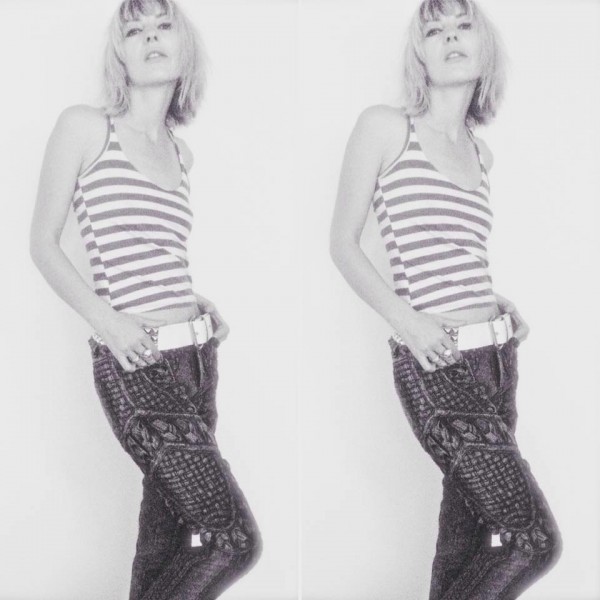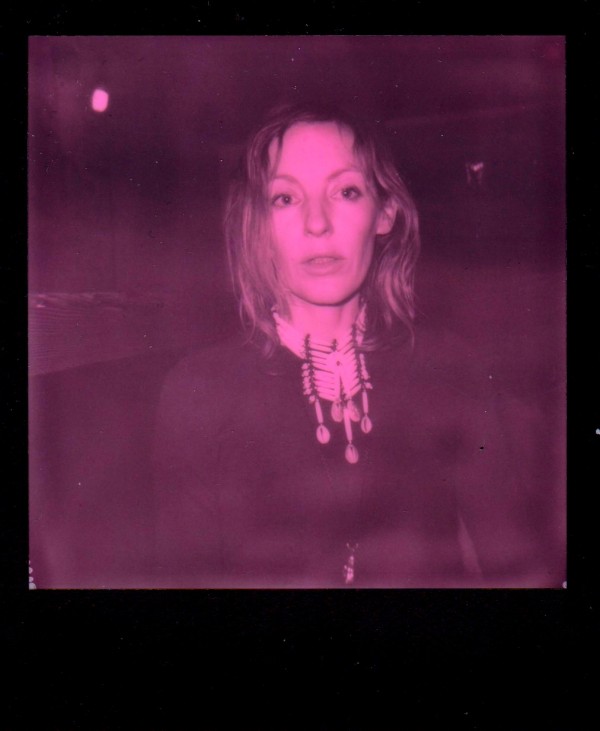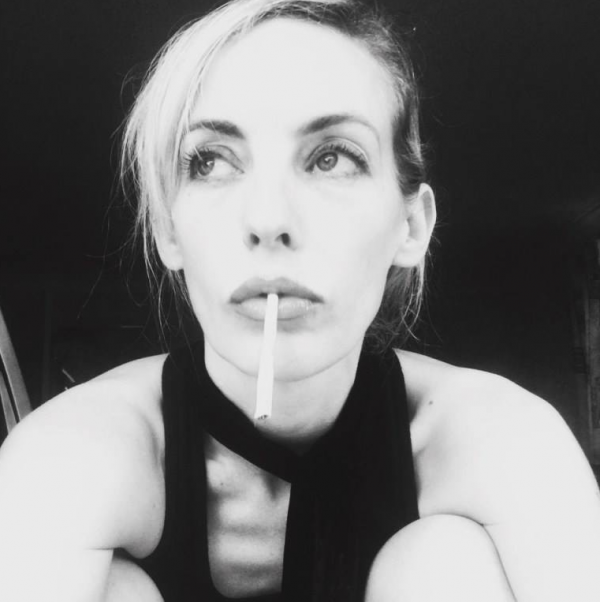Kirsty Allison: “Life’s too short to fuck around”

I met Kirsty Allison in London in February 2015 after a performance I did with hackedepicciotto at Café Oto. She had invited me to do a reading in London months before, but as I was on tour it did not work out. I found our correspondence intriguing, she seemed to be at the pulse of London’s literature and spoken word scene which I am very interested in.
Not long after I was invited to London again to speak at a panel and Kirsty asked me to stay longer so we could do an interview, which I did and we spent a wonderful afternoon in an empty, very stylish London café speaking about our lives and love of language. The story goes that she could not place the interview in any of the London magazines as planned, so she rebelliously decided to start her own fanzine and founded “Cold Lips”.
When Kirsty decides to do something she does it with zest: “Cold Lips” was to become London’s hippest new spoken-word/fashion zine and a spin off of her already infamous Sylvia Plath fan club, an anti literary club night she had founded the same year in which she explores the space between literature and poetry. Kirsty has now released quite a few of these wonderful issues besides organizing their release parties all over Europe. At these parties she not only contacts the many poets that perform but performs her own poetry and spoken word as well.
Kirsty Allison is a trained journalist/ writer who has worked for BBC radio and has been published in Vogue, The Guardian, Dazed, Elle, Ambit, Illustrated Ape and the Opiate. She has also worked for pirate stations and toured with Irvine Welsh and Kris Needs in her early 20ies DJing and performing poetry. She is currently preparing a spoken word tour of her poems for the fall of 2018 and is writing her debut novel, which will be published by Wrecking Ball Press. I deeply appreciate the energy and time she invests into promoting and publishing poetry, lyrics and spoken word as I find that this area of language is usually sorely neglected. Kirsty is one of those people that creates her own universe, not accepting a no for an answer, no matter how difficult or challenging it may be. I think she is wonderful and a true inspiration.
 Danielle de Picciotto: Kirsty, you work with words and are known as a journalist, spoken word artist and the main editor and founder of “Cold Lips” magazine. What is it that fascinates you in working with language? Is there a difference in writing or performing words?
Danielle de Picciotto: Kirsty, you work with words and are known as a journalist, spoken word artist and the main editor and founder of “Cold Lips” magazine. What is it that fascinates you in working with language? Is there a difference in writing or performing words?
Kirsty Allison: I love the bondage of the monochrome. Black on white is my most mindful restriction, and yes, I know you can change the background and text colors, and I often write in purple ink – but basically, I’ve worked in all mediums, writing is my base, and I’ve thrown out hundreds of thousands of black words from myself onto white backgrounds. I enjoy the pure torture of finding the exact sparks of expression to create anywhere near the color of music, or beauty of paint placed beautifully on canvas, or the swish of perfectly cut silk around the body, but I find the limitations of words as infinite as the stars and space. Any boundary is potentially limitless – but I’m pretty synaethesic, and visually precise, so if I can lever part of those afflictions onto the page, I feel calm, and like I’ve achieved balance. The difference in performing is that an audience can’t always withstand the attention of reading a page – there’s so much else in that environment: lights, elevation, a fine cocktail in the hand (particularly at the sort of gigs I do, which are often with bands). So there’s way more in the mix, which is worth playing with – and I’m not a trained performer, and was always more a DJ than a singer -, but the stage does share an intimacy that you have with a reader. I used to obsess about the mechanical differences between what worked on page, what works as a performance piece, but now I’ve found my rhythm, the two dance, and twist, and I’ve stopped being so concerned of the principles – as I get better at it, the riot of surfing on the vibes of an audience becomes more addictive: it’s like bearing your heart in your hands. Good poetry brings people together, and there’s nothing like instigating that.
Danielle de Picciotto: What do you look for in literature? Who are your fav writers?
Kirsty Allison: I look for beauty. As I’ve had to work commercially, as a journalist and writer since being a teenager, house-style interferes with the luxury of sprawling louchely over parchment. I love what Gay Talese, Joan Didion, Tom Wolfe and Hunter S. Thompson did for journalism, but it’s rare to have the space for literary journalism, or editors who can afford to nurture those skills.
Hence, the metaphorical morays of DBC Pierre appeal, the lush magic of Angela Carter, but also the wonderful restriction of Paul Auster and the punk cutting of extraneous words I’ve taken from him, and the same from the poetry of Thurston Moore. There’s a lack of pretension in a lot of US writing that I love – Rob Plath who I’m delighted to be publishing in “COLD LIPS”, he’s giving us the last interview with Dan Fante soon.
I grew up DJing with Irvine Welsh, and what he did to disrupt the canon of what we perceive to be literature is a break that wouldn’t arrive in mainstream literature right now, and we are the worse for it. He’s a story obsessive, and miraculously seems fairly unscathed by the self-consciousness of writers operating in the contemporary industrial commercial sphere, where you see destructive self-awareness overtake the process. In the past I’ve loved Michel Houellebecq and Hanif Kureishi, and other big sellers like Donna Tart. She’s a grown up Jackie Collins – she spins so many words across pages, and although I can lever into the echelons of educative privilege (that I read Huncke, Dan Fante, David Noone to escape) I can only aspire to pull people over pages as any of them do. Ralph Ellison’s Invisible Man made a deep impression on me, and Tom Spanbauer. I hate reading the blurbs, and when I give people books, they’ll often be disappointed that it comes without a back cover. I’ll rip them off. A book is designed by the writer from the first page, so read that rather than the blurb to see if it agrees with you.
I’m still catching up on the classics, and will be forever. Bulgakov is one I’m on currently. I admire most writers that I get to the end of: your book, Danielle, actually, both of them, are above my desk, aside John King, Poppy Z. Brite, print outs of Trocchi, John Niven, Nabakov, Jacqueline Susann, Martin Amis, Hans Fallada, Hermann Hesse, Balzac – I’ll take it all… I move the books around the house, and my place is a bit of a music bookshop. I read a lot as editor of arts on DJ Mag: Akala’s polemic on race is a perfect antidote for the rhetoric of mass media propaganda – that’s just made the DONE pile, but the IN tray rarely stops. A Treatise on White Magic by Alice A. Bailey is the best self-help book I’ve found. It was a gift, and a fave of Lou Reed’s. I’m still dipping into that.
 Danielle de Picciotto: What persona do you have when you perform spoken word? Is it a different one from your everyday life?
Danielle de Picciotto: What persona do you have when you perform spoken word? Is it a different one from your everyday life?
Kirsty Allison: I’m harder on stage. I went through a shouty phase – because a lot of poetry is an exorcism of our times, even the love poetry was a fight to survive. I’m getting softer. I’m purer me on stage. I’m less watered down. We have to dilute ourselves for survival in banal everyday life. The stage opposes that.
Danielle de Picciotto: You released “Cold Lips” in 2015. Why do you think it is important to have print media in comparison to digital media?
Kirsty Allison: It’s like being in Barbarella’s underground printing bunker sometimes. Some of our writers have very real concerns about not wanting to have their words shared online, as the whole point in publishing anything worthwhile is to have an element of the subversive. But their concerns that their words, and true beliefs, will affect their ability to survive financially are very real. Basically, we won’t get jobs in their world if we criticize it, so we’re creating our own World. We’re having a dialogue for alternatives, mass media is too co-opted for the kind of discussions we have, and social media is the biggest prison of consciousness on that level. Sure there are positives to digital – we reach people that wouldn’t know of us, and some of the content we create online for “Cold Lips” stands alone, such as the film we’re releasing on the site soon, on Billy Childish, but it is only an extension of what we set out to do in print, it’s not digital first, it is paper first. We’re not looking to tell stories as multi-media 360 experiences. I’ve done that commercially, and I’ve fought hard to get to a point where I’m willing to publish against the mainstream. We live in very dangerous times, and few people are brave enough to admit that, or have the abilities to put their necks on the line, against the system that enslaves them.
Digital existence is a constant theme in my work, discussions, panels, art, poetry, but that’s because my first base would always be books, despite always having a phone in my hand. The luxuries of painting, music, film, and fashion are secondary.
Working within the parameters of 250g covers comes back to my need for restriction, and in this case, against the sprawl of digital content. Each edition gets tighter and although many of the ideas may be essay-based, that doesn’t prevent concepts from going somewhere else. It’s good to expand in and out of mediums, and paper is currently where I’m at.
Danielle de Picciotto: What does “Cold Lips” want to present? Certain style?
Kirsty Allison: We want to keep subculture alive, fertilize ideas, have conversations, make it a safe place for radical writing, and give opportunities to people who aren’t generally found elsewhere: new, infamous, once-known, should-be-remembered, all of us. Offering insight to people who are cool as fuck. We have a code of conduct on our website which contributors receive a press card for if they are in agreement, and supply us with a photograph. There’s so much noise and ego in creativity, that’s the sentiment we’re trying to avoid – there are too many “public figures” on Instagram that are maybe public because they’re obsessed by how they’re perceived by the public, and this is generally a need relating to a financial index rather than an intellectual one. We’re trying to create a more private world – not in the private members club sense of Tory privacy of places where you can take cocaine away from stop and search. This is head on. All you carry with you is your table manners, and much as I eat with my hands. I meet people who are cool, that breathe from others, and those who are uncool – life’s too short to fuck around. To quote my friend Ernesto Leal’s old record label Arthrob tagline, from before he set up Red Gallery: “We don’t deal with cunts.” I can’t help but finally be influenced by that. In terms of style, I just want intelligent, rock n roll, progressive classy folk times with a bit of punkass acid house spirit…
Danielle de Picciotto: What are you working on currently?
Kirsty Allison: My first EP, which will be hopefully out June 15th for the “COLD LIPS” party at The Social in London. Sex Cells are also playing, and a new electronic act that I’m excited about: VOODOOTRON. We have the pleasure of Lol Hammond and Douglas Hart DJing, and a super special writer coming in. Also premiering our Billy Childish short film. I’m about to go on a lil tour of Amsterdam, Berlin, and Riga, and back for some gigs in London, and some festivals. I’ve got some art in a show at Gallery 46 in August, the film collab I did with Gil De Ray, DOUBLEPLAY will premiere in London – but some of my own work that riffs from that.Was just in a film for Kelli Ali too, “Ghost Driver”. I play a fucked up movie star, Grace Rider. That’ll complete later this year.
Danielle de Picciotto: What are you planning for the future?
Kirsty Allison: My novel is out next year. Shane Rhodes at Wrecking Ball Press has taken it on, and he’s the coolest publisher I’ve ever met. Dan Fante left Canongate to be published by him. He’s also put out Will Self, Adelle Stripe, Tony O’Neill. Think it may be hardback too. He’s a great poet, and I’m very proud that an independent of his caliber cares enough to put my words on paper. Beyond that, living every day like it’s my last…y’know!
















